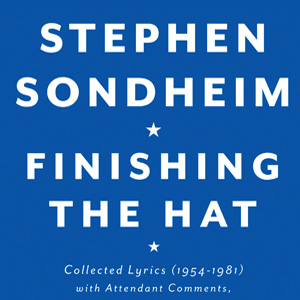There may never have been a book quite like Stephen Sondheim’s Finishing the Hat: Collected Lyrics (1954–1981), in which an 80-year-old songsmith takes an X-ray to his work, while evaluating predecessors too dead to complain. “I like to pontificate as much as anyone who thinks he knows what he’s talking about,” says Sondheim, and this book is indeed satisfyingly pejorative.
One by one, Sondheim goes after the greats of the musical theater beginning, with his friend and mentor Oscar Hammerstein II (of Rodgers and …). Sondheim’s objections come from a number of sides. One is that the more mature subject matter of O&H put a chill on “the delight in lyrics for lyrics’ sake.” He cites also the curdled influence of early 1900s operetta in Hammerstein’s work, as well as the persistent avian imagery: anything, as Sondheim says, with wings or feathers. This is probably why the author objects to the Oklahoma! lyric about watching a hawk making lazy circles in the sky, one of Hammerstein’s most rapturous verses—and hardly fiction, either; it’s an accurate summing up of what you might see if you visited Oklahoma. Yet Sondheim himself wrote a brilliant emulation of the caged-bird music-hall tune for Sweeney Todd, possibly inspired by “Goodbye, Little Yellow Bird” from the 1945 film of The Picture of Dorian Gray.
The composer’s opinions on both flops and hits are measured and without excuses. Note his comment on the 1960s financial failure Anyone Can Whistle, which sounds like a parody of The Song of Bernadette crossed with the sentimental French film King of Hearts. Sondheim says, “The fault was not in our stars but in ourselves.” Pity, since one of the stars, Lee Remick, must have been something to see doing an ooh-la-la mam’selle Frenchy number titled “Come Play Wiz Me.”
Always considered caviar to the general audience, Sondheim may be best known for “Send in the Clowns,” covered by everyone from Judy Collins to Krusty the Klown. This, despite the shrewd, politically pointed writing in West Side Story and A Funny Thing Happened on the Way to the Forum. Similarly, despite the ingenuity of dozens of songs that glitter in cabarets and jazz clubs everywhere, it’s Sweeney Todd that hooks me most.
“I liked theater, but I loved movies,” Sondheim says, when introducing the transcribed lyrics of Sweeney Todd. It was inspired by Bernard Herrmann’s score for Hangover Square; this is essentially a cinematic “movie for the stage” and resulted in the best of the five film adaptations of his work. This blood opera is a classic of 1970s art and attitude. Its short first run coincided with the fall of Carter and the rise of Reagan. Even though set in the early Victorian era, Sweeney Todd sums up everything that one loved the most about that fractious decade: the punk morbidity, the merciless iconoclasm, the lament for urban misery, the rampant social equality that was so soon to be undone by the aristocracy of ’80s big money. Maybe it’s my prejudice, reading this book of prejudices, but Todd seems the flowering of what Sondheim was trying do. It’s the next-to-last study in a book that could seriously use a sequel.
Finishing the Hat: Collected Lyrics (1954–1981)
By Stephen Sondheim
Knopf, 480 pages, $39.95 hardback




